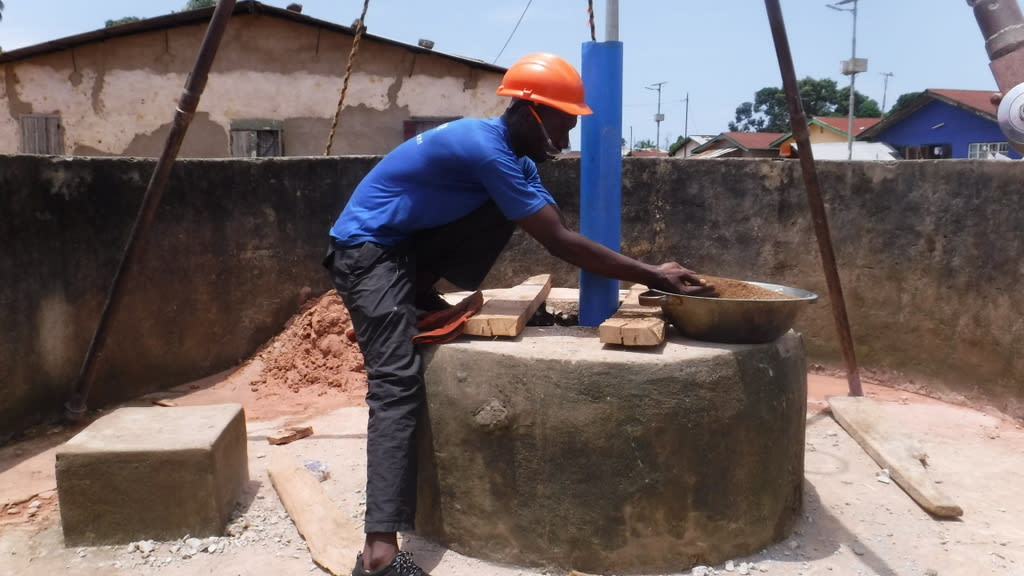Masoila is a very large community located at the center of Lungi, close to the Freetown International Airport. Apart from the loud noise of aircraft coming and going out of the country, this community has a large Mosque that is often visited by people traveling to and from Sierra Leone.
The community is not very vegetated because of its location, but there are some mango trees and other fruit plantations that looked so colorful when our teams visited. During the dry season, these trees give the community people shade to rest and enjoy some fresh air.
Most buildings around this community are modern buildings with concrete blocks and zinc roofs, though there are a few buildings with mud blocks and zinc roofs too. The majority of these houses are built large to accommodate extended families.
Petty trading and the sale of farm produce by a few farmers in the community is the most common livelihood here. During some special market days in other rural communities, called lumas, women from this community go and buy farm produce which they bring back to sell at their little marketplace to earn their daily living.
There are also a few people who engage in other types of vocational trades like working at the airport, bread baking, and soapmaking. Bread is one of the locally made products that is sold in large quantities every day. Some men and women in this community engage themselves in bread baking by building bakeries at the back of their houses to earn them money to better provide for themselves and their families.
Water is a crucial part of daily life for people in Masoila. However, the well located at #3 Kamara Street is facing challenges. With more than 500 people relying on the well to meet their water needs, it struggles during the dry season and when the water table drops. There are periods when it goes dry and the packaged water sold by vendors is very expensive to purchase for the average person.
As a result, people have to travel long distances to reach the nearest working well. The time and energy lost by getting water each day is a burden on families in this community. We visited more than 60 households while in the community and found only 1 handwashing station with water. This is the result of the water shortages faced by the community. As a result, people rarely wash their hands after using the bathroom - a behavior that leads to the spread of diseases. With a regular water source, this problem can disappear immediately!
The Kamara Street community has long been praying for this project. Shiek Fuad Koroma, the Chief Imam of the Kamara Street Central Mosque said that he has been asking for help to repair the well. This well is the only water point that is supplying the Mosque.
"Clean water is the backbone to having a clean and healthy community environment,” said Shiek Koroma.
"I can remember not too far in the past when our country was ravaged by Cholera and Ebola. The effects of not having clean water were then felt throughout the country."
Here’s what we’re going to do about it:
Well Rehabilitation
The well marked for this overhaul needs major work to supply adequate, clean water to the community year-round. The pump will be removed, and a hand auger will be lowered inside and powered by a drill team. This hand auger will allow the team to drill several meters deeper to hit a sufficient water column that will ensure the well supplies water throughout all seasons.
As the team drills, casing will be installed, transforming the bottom of this hand-dug well into a borehole. PVC piping will connect this lower system directly to the pump, a combination that we know will also improve the quality of water.
Once this plan is implemented, everyone within the community will have access to safe drinking water in both quality and quantity, even through the dry months.
Hygiene and Sanitation Training
There will be hygiene and sanitation training sessions offered for 3 days in a row.
No handwashing stations were observed here. After our visit, the hygiene and sanitation trainer decided it would be best to teach community members how to build a tippy tap (a hands-free handwashing station built with a jerrycan, string, and sticks). They will use these tippy taps for handwashing demonstrations, and will also teach about other tools like dish racks and the importance of properly penning in animals to keep them away from people's food and water.
These trainings will also strengthen the water user committee that manages and maintains this well. They enforce proper behavior and report to us whenever they need our help solving a serious problem, like a pump breakdown.

 Borehole Well and Hand Pump
Borehole Well and Hand Pump


































